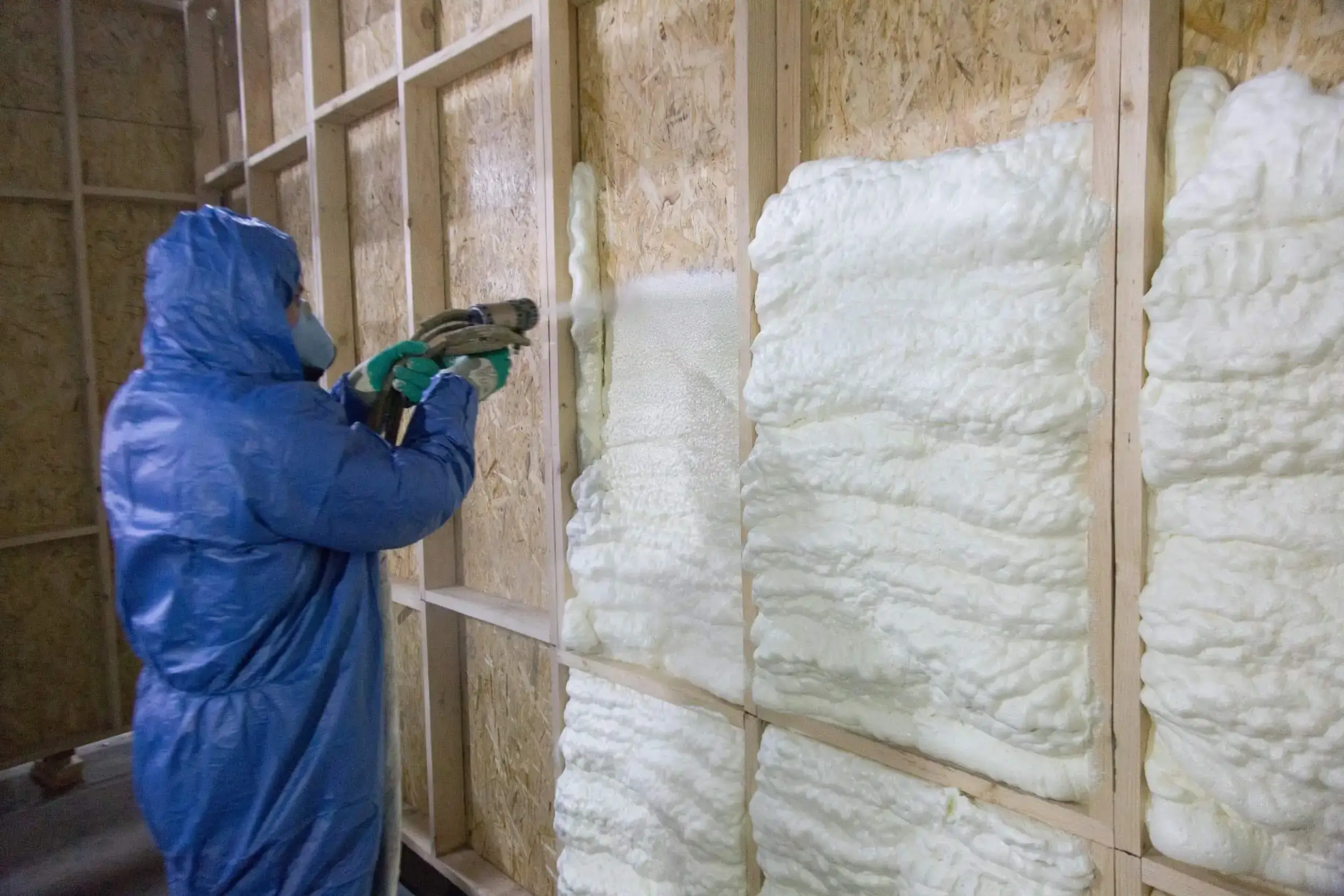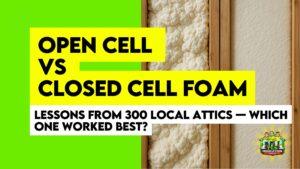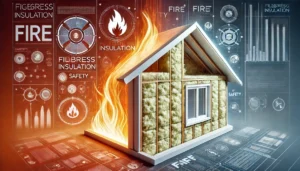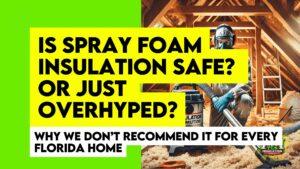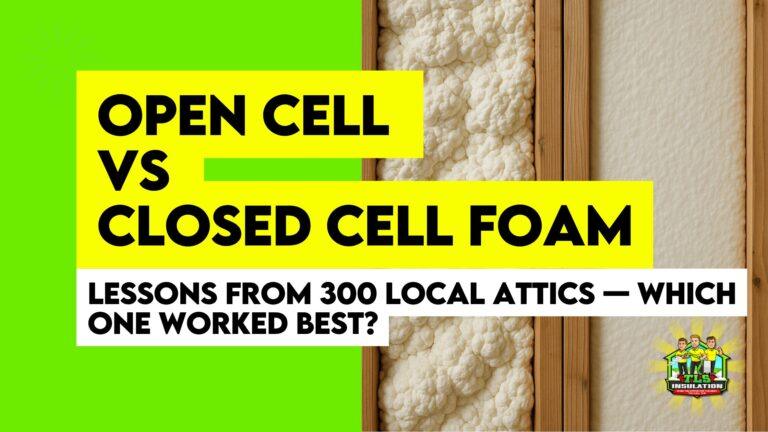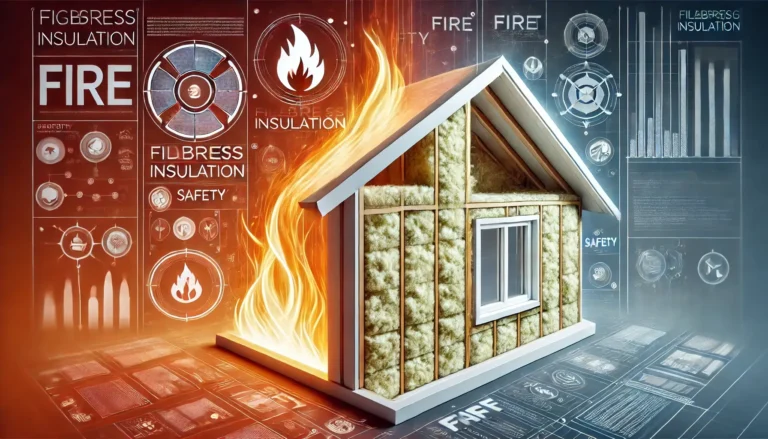Effective commercial insulation can reduce energy consumption by up to 30% in commercial buildings, according to the U.S. Department of Energy. However, many business owners fail to prioritize it, leading to inflated energy bills and inefficient temperature control. By choosing the right insulation for your business, you can significantly improve energy efficiency, reduce operational costs, and create a more comfortable work environment.
This guide will break down the different types of commercial insulation to help you make an informed decision, ensuring long-term savings and better performance for your commercial property
Insulation Types Comparison
| Insulation Type | Cost | Practicality | Lifespan | Performance | Key Benefits |
|---|---|---|---|---|---|
| Fiberglass Insulation | Low to Medium | Easy to install, common for walls, ceilings, and floors | 20-30 years | Moderate R-value (2.9-3.8 per inch) | Fire resistance, soundproofing, cost-effective |
| Foam Board Insulation | Medium | Lightweight, high thermal resistance, DIY-friendly | 30-50 years | High R-value (4-6.5 per inch) | Moisture-resistant, great for limited space installations |
| Mineral Wool Insulation | Medium to High | Fire-resistant; often used in industrial settings | 30-50 years | High R-value (3.7-4.2 per inch) | Fireproof, soundproof, water-resistant, good for high-heat areas |
| Rigid Board Insulation | Medium to High | Dense; requires precise installation, often for roofs and walls | 50+ years | High R-value (5-8 per inch) | Long-lasting, moisture-resistant, high thermal performance |
| Polyiso Insulation | High | Lightweight and high-performing; used in flat roofs and walls | 50+ years | High R-value (5.6-8 per inch) | Superior thermal performance, moisture resistance |
| EPS (Expanded Polystyrene) | Low to Medium | Affordable; often used in packaging and insulation boards | 50+ years | Low to moderate R-value (3.6-4.2 per inch) | Cost-effective, moisture-resistant, versatile |
Best Types of Commercial Insulation for Various Applications
1. Fiberglass Insulation
- Best Use Case: Commercial buildings, walls, ceilings, and attics.
- Life Span: 20-30 years with proper maintenance.
- Practicality: Cost-effective, easy to install in various building structures.
Fiberglass insulation is made of fine glass fibers and is one of the most widely used types of insulation due to its affordability and versatility. It works well in maintaining energy efficiency in commercial buildings.
However, When considering fiberglass installation, it’s important to keep in mind the blown-in insulation cost per square foot can vary based on the size and complexity of the project
Pros
- Cost-effective and widely available.
- Provides fire resistance and excellent noise reduction.
Cons
- Can cause skin irritation if improperly handled.
- Loses effectiveness if exposed to moisture.
2. Foam Board Insulation
- Best Use Case: Commercial roofing, walls, and foundations.
- Life Span: 50+ years with proper protection from moisture.
- Practicality: Lightweight, easy to handle, and ideal for high moisture resistance.
Foam board insulation offers high thermal resistance and is frequently used in insulating garage door, for roof insulation, and foundation walls for its ability to reduce heat transfer and withstand moisture infiltration.
Pros
- Provides excellent moisture resistance and thermal performance.
- Thin profile while maintaining a high R-value per inch.
Cons
- Expensive compared to other types.
- Can be challenging to install in irregular spaces.
3. Rigid Board Insulation
- Best Use Case: Flat roofs, exterior walls, and foundations.
- Life Span: 30-40 years depending on exposure to elements.
- Practicality: Suitable for large-scale commercial properties, offering high thermal efficiency.
Rigid board insulation is made from high-density materials like polyiso or XPS. It’s particularly effective for projects where space is limited but high thermal insulation is required.
Pros
- High insulating value per inch, excellent for space-saving.
- Resistant to moisture and fire.
Cons
- Can be expensive.
- Requires precise installation for best performance.
4. Mineral Wool Insulation
- Best Use Case: Soundproofing, high-heat areas, and fire-resistant applications.
- Life Span: 50+ years with proper maintenance.
- Practicality: Ideal for fire resistance and soundproofing, commonly used in industrial applications.
Mineral wool insulation is known for its fire resistance and ability to withstand extreme temperatures, making it ideal for industrial or commercial applications where fire safety is a concern.
Pros
- Provides excellent fire resistance and soundproofing.
- Non-combustible, contributing to overall safety.
Cons
- Can be costlier than fiberglass.
- Requires careful installation to avoid settling over time.
5. EPS (Expanded Polystyrene) Insulation
- Best Use Case: Flat roofs, walls, and commercial foundations.
- Life Span: 50+ years with minimal maintenance.
- Practicality: A lightweight, highly durable material, excellent for moisture resistance and thermal efficiency.
EPS insulation offers high thermal resistance, making it ideal for applications like flat roof insulation in commercial buildings. It provides significant moisture resistance and is also widely used in wall systems.
Pros
- Exceptional moisture resistance and thermal performance.
- Lightweight and easy to install.
Cons
- Limited fire resistance without additional treatments.
- May require additional protective barriers in high-exposure areas.
6. Polyiso (Polyisocyanurate) Insulation
- Best Use Case: Roofing systems, walls, and foundations.
- Life Span: Lasts over 50 years with minimal degradation.
- Practicality: Provides the highest R-value per inch among common commercial insulation materials.
Polyiso insulation is known for its high R-value, making it perfect for energy-efficient commercial roof systems and thermal resistance. It is a popular choice for commercial roofing due to its durability and efficiency.
Pros
- Offers the highest R-value per inch.
- Excellent for thermal resistance and moisture control.
Cons
- Higher cost compared to other materials.
- May degrade with prolonged moisture exposure without protective layers.
Benefits of Commercial Insulation
Commercial insulation offers a multitude of advantages that can significantly impact a business’s operational efficiency and overall comfort. Here are the key benefits:
- Energy Efficiency: By minimizing heat transfer, commercial insulation reduces energy consumption. According to the U.S. Department of Energy, properly installed insulation can lower energy bills by up to 20%. This can translate to substantial savings over time, especially in large commercial properties.
- Temperature Regulation: Insulation materials, such as fiberglass when rightly blow via professional blow in contractor, help maintain optimal indoor temperatures, leading to a more comfortable working environment for employees and customers alike. This consistency is crucial for businesses that rely on climate control for product storage, such as food service and pharmaceutical companies.
- Noise Reduction: Quality insulation serves as a sound barrier, which is particularly beneficial in urban settings. Mineral wool insulation, for instance, excels at dampening sound, creating a quieter workspace conducive to productivity.
- Fire Resistance: Many insulation materials, including fiberglass and mineral wool, provide fire resistance, enhancing the overall safety of commercial buildings. This added layer of protection can be crucial for compliance with local building codes.
- Increased Property Value: Investing in insulation can improve the overall value of commercial properties, making them more attractive to potential buyers or tenants. Enhanced energy efficiency and comfort contribute to a better return on investment.
Common Mistakes to Avoid in Commercial Insulation Installation
Avoiding common pitfalls during the commercial insulation installation process is essential for maximizing performance and longevity. Here are some critical mistakes to steer clear of:
- Neglecting Proper Assessment: Failing to evaluate the building’s specific insulation needs can lead to inadequate coverage. A thorough assessment by a qualified insulation contractor ensures that the right materials and methods are used.
- Overlooking Moisture Management: Insufficient moisture control can lead to mold growth and compromised insulation performance. Using moisture-resistant materials and implementing proper ventilation systems are essential to preventing issues.
- Ignoring R-Value Recommendations: Each insulation type has a specific R-value, which measures its thermal resistance. Choosing materials with inadequate R-values for the climate and application can significantly reduce energy efficiency.
- DIY Installation Missteps: While DIY projects can save costs, improper installation can negate insulation benefits. For complex installations, it is often best to rely on experienced professionals to ensure compliance with building codes and optimal results.
- Underestimating Long-Term Maintenance: Insulation requires periodic inspections and maintenance to ensure its effectiveness. Failing to address issues like settling, moisture infiltration, or damage can lead to reduced performance and increased costs in the long run.
Frequently Asked Question
What types of insulation are best for commercial buildings?
The best types of insulation for commercial buildings include fiberglass, spray foam, and mineral wool, each offering unique benefits in terms of thermal performance and energy efficiency.
How does insulation impact energy bills?
Quality insulation minimizes heat flow, leading to significant reductions in energy consumption, which can lower utility bills by up to 20% over time.
What is the typical lifespan of commercial insulation?
Most types of commercial insulation, like fiberglass and rigid foam, have a lifespan of 25 years or more when properly maintained.
Can I install insulation myself, or should I hire a contractor?
While DIY installation is possible, hiring a professional insulation contractor is often recommended to ensure proper installation and compliance with building codes.
How often should I inspect my commercial insulation?
It is advisable to inspect commercial insulation annually or after significant weather events to check for moisture issues, settling, or damage.


